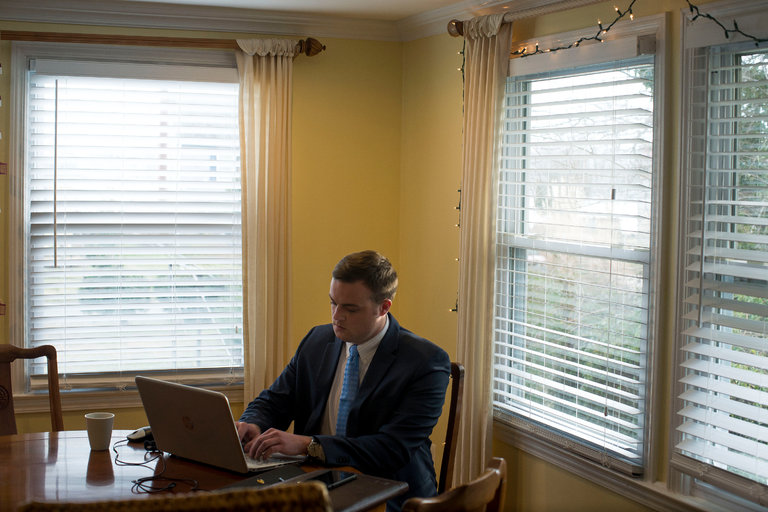ANNAPOLIS, Md. — It was early fall, and Donald J. Trump, behind in the polls, seemed to be preparing a rationale in case a winner like him somehow managed to lose. “I’m afraid the election is going to be rigged, I have to be honest,” the Republican nominee told a riled-up crowd in Columbus, Ohio. He was hearing “more and more” about evidence of rigging, he added, leaving the details to his supporters’ imagination.
A few weeks later, Cameron Harris, a new college graduate with a fervent interest in Maryland Republican politics and a need for cash, sat down at the kitchen table in his apartment to fill in the details Mr. Trump had left out. In a dubious art just coming into its prime, this bogus story would be his masterpiece.
Mr. Harris started by crafting the headline: “BREAKING: ‘Tens of thousands’ of fraudulent Clinton votes found in Ohio warehouse.” It made sense, he figured, to locate this shocking discovery in the very city and state where Mr. Trump had highlighted his “rigged” meme.
“I had a theory when I sat down to write it,” recalled Mr. Harris, a 23-year-old former college quarterback and fraternity leader. “Given the severe distrust of the media among Trump supporters, anything that parroted Trump’s talking points people would click. Trump was saying ‘rigged election, rigged election.’ People were predisposed to believe Hillary Clinton could not win except by cheating.”
The money, not the politics, was the point, he insisted. He had graduated from Davidson College in North Carolina in May, and he needed to pay his living expenses. “I spent the money on student loans, car payments and rent,” he said.
By the time he launched his fraudulent story on ballot fraud, he had found minimal success with “Hillary Clinton Blames Racism for Cincinnati Gorilla’s Death,” a reference to the sad tale of Harambe, the gorilla shot after he grabbed a little boy visiting the zoo. He had done better with “Early Morning Explosion in DC Allegedly Leaves Yet Another DNC Staffer Dead,” spinning off conspiracy theories around the earlier shooting death of a Democratic National Committee staff member.
Later, he would tell gullible readers “NYPD Looking to Press Charges Against Bill Clinton for Underage Sex Ring,” “Protesters Beat Homeless Veteran to Death in Philadelphia” and “Hillary Clinton Files for Divorce in New York Courts.” Eight of his stories would merit explicit debunking by Snopes.com, the myth-busting site, but none would top the performance of the ballot box fantasy.
President Obama thought the fake news phenomenon significant enough to mention it as a threat to democracy in his farewell speech in Chicago last week. “Increasingly,” he said, “we become so secure in our bubbles that we start accepting only information, whether it’s true or not, that fits our opinions, instead of basing our opinions on the evidence that is out there.”
10 Times Trump Spread Fake News
Donald J. Trump has used false claims to attack political opponents, question the legitimacy of the Obama administration and undermine the news media. The practice has paralleled his rise from reality TV star to holder of the nation’s highest elected office.

That was exactly the insight on which Mr. Harris said he built his transient business: that people wanted to be fed evidence, however implausible, to support their beliefs. “At first it kind of shocked me — the response I was getting,” he said. “How easily people would believe it. It was almost like a sociological experiment,” added Mr. Harris, who majored in political science and economics.
By his account, though he voted for Mr. Trump, his early preference had been for Senator Marco Rubio. Mr. Harris said he would have been willing to promote Mrs. Clinton and smear Mr. Trump had those tactics been lucrative. But as other seekers of clicks discovered, Mr. Trump’s supporters were far more fervent than Mrs. Clinton’s.
In late October, with the inevitable end of his venture approaching, Mr. Harris sought an appraisal for the web domain that by then had vaulted into the web’s top 20,000 sites. An appraiser said that given the traffic, he could probably sell it for between $115,000 and $125,000.
But Mr. Harris made a costly mistake: He decided to wait. Days after the election, denounced for making the peddling of fake news remunerative, Google announced that it would no longer place ads on sites promoting clearly fabricated stories.
A few days later, when Mr. Harris checked his site, the ads were gone. He checked with the appraiser and was told that the domain was now essentially worthless.
All was not lost, however. He had put a pop-up on the site inviting visitors to “join the ‘Stop the Steal’ team to find out HOW Hillary plans to steal the election and what YOU can do to stop her!” and collected 24,000 email addresses. He has not yet decided what to do with them, he said.
Asked whether he felt any guilt at having spread lies about a presidential candidate, Mr. Harris grew thoughtful. But he took refuge in the notion that politics is by its nature replete with exaggerations, half-truths and outright whoppers, so he was hardly adding much to the sum total.
“Hardly anything a campaign or a candidate says is completely true,” he said.
Lately he has picked up Mr. Trump’s refrain that mainstream news organizations are themselves regular purveyors of fake news. Last week, when BuzzFeed released what it called an “explosive but unverified” dossier suggesting that Russia had planned to bribe and blackmail Mr. Trump, Mr. Harris wrote on Twitter:
“Explosive but unverified”
That could describe every fake news headline ever. https://t.co/hj5fgvVfHn— Cam Harris (@camharris_us) Jan. 11, 2017
He did not mention his own expertise in the field.


